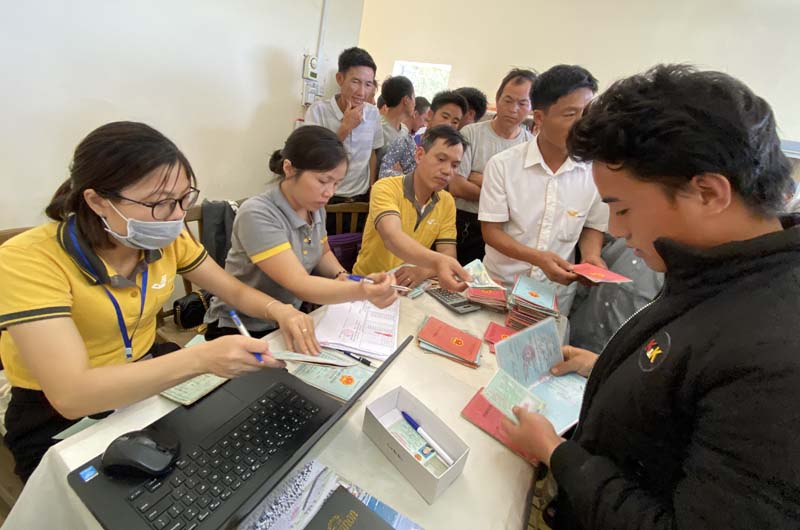
(HBO) – As of the end of May 12, Mai Chau district of Hoa Binh province had completed the provision of financial aid for people affected by the COVID-19 pandemic, comprising national contributors, those subject to social protection, and poor and near-poor households.
 The provision of financial support for poor and near-poor
families in Pa Co commune of Mai Chau district has been carried out in line
with regulations.
The provision of financial support for poor and near-poor
families in Pa Co commune of Mai Chau district has been carried out in line
with regulations.
The Government’s Resolution 42, dated April 9,
2020, on measures supporting people with pandemic-related difficulties and the
Prime Minister’s Decision 15/2020/QD-TTg are of importance since they aim to
opportunely assist vulnerable groups so that no one is left behind.
Mai Chau, which has a large area covering 16
communal-level localities, is one of the mountainous districts with special
disadvantages. like other localities in the province, it also encountered
certain difficulties in surveying people eligible for the aid.
Despite this, all-level authorities and sectors
are exerting efforts to help people impacted by the COVID-19 pandemic. They
have also stepped up communications to promote the spirit of sharing, thus
encouraging people with better conditions to lend a hand to those with more
disadvantages.
So far, the provision of aid, worth nearly 15.3
billion VND (663,400 USD) in total, has been completed with 18,019
beneficiaries, consisting of 376 revolution contributors, 1,945 others subject
to social protection, 15,698 poor and near-poor households. It was reportedly
done in an open and transparent manner and without mistakes.
The district’s authorities are reviewing local
individual business households so as to give support to those with annual
revenue of under 100 million VND, employees whose labour contracts were
suspended or terminated, and others without labour contracts who have been
influenced by the pandemic./.
More than just an information technology teacher, Bui Van Nien is an inspiring figure who has nurtured the scientific curiosity and creative spirit of students in Vietnam’s ethnic minority communities.
Da Bac is the most disadvantaged mountainous district in Hoa Binh province, with ethnic minorities accounting for about 90% of its population. Over the past years, the district has mobilised resources to implement ethnic policies to improve the quality of life of local people.
In recent years, Hoa Binh province has consistently prioritised the protection, care, and education of children, particularly those from ethnic minorities and disadvantaged backgrounds, by creating a safe, healthy, and nurturing environment for their all-round development.
The Steering Committee for Tobacco Harm Prevention and Control of Hoa Binh province, in coordination with the Tobacco Harm Prevention and Control Fund, held a ceremony on May 28 in response to the World No Tobacco Day (May 31) and the National No Tobacco Week (from May 25 to 31). The event was chaired by Nguyen Van Toan, Standing Vice Chairman of the provincial People’s Committee and head of the Steering Committee.
Since 2021, the Center for Industrial Promotion and Industrial Development Consulting (CIIDC) under the Department of Industry and Trade has been implementing a school lighting model as part of the plan for using energy efficiently and economically in Hoa Binh Province in the pẻiod of 2021 - 2025. This model not only aims to improve the learning conditions and enhance the education quality, but it also promotes the message of energy saving, energy security, environmental protection and contributes to the goals of socio-economic development.
In the 2024 - 2025 school year, the entire Hoa Binh provincial education sector includes 520 educational institutions and schools. Among them are 13 ethnic boarding schools with 153 classes and 4,487 students. Four of these schools have met national standards, reaching 30.7 percent.



 The provision of financial support for poor and near-poor
families in Pa Co commune of Mai Chau district has been carried out in line
with regulations.
The provision of financial support for poor and near-poor
families in Pa Co commune of Mai Chau district has been carried out in line
with regulations.